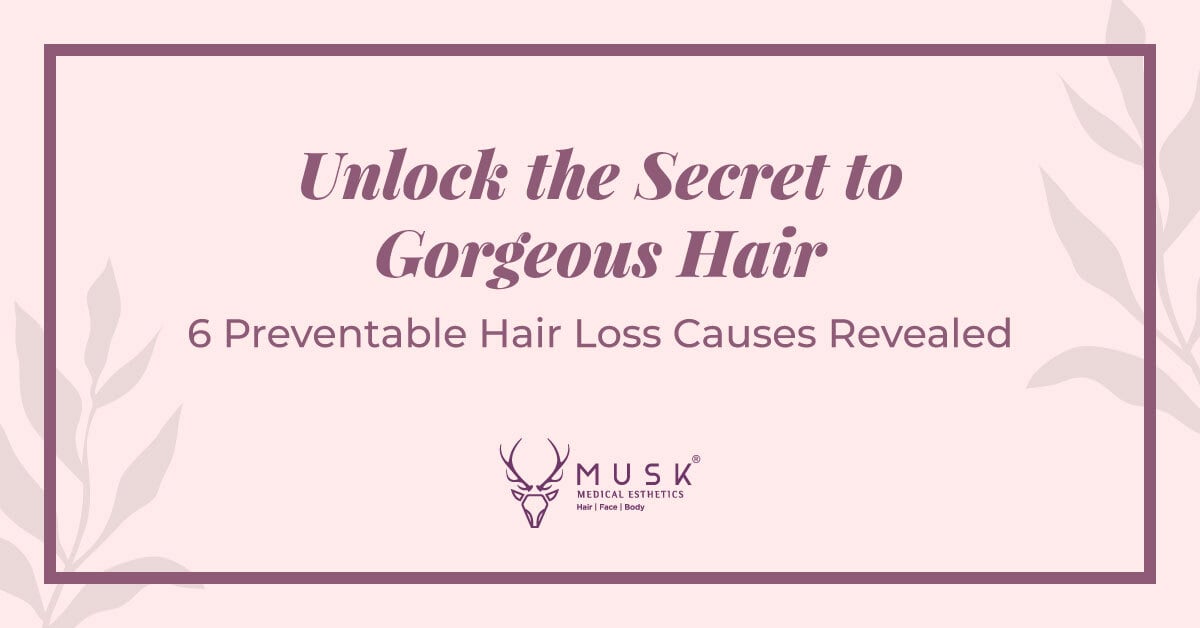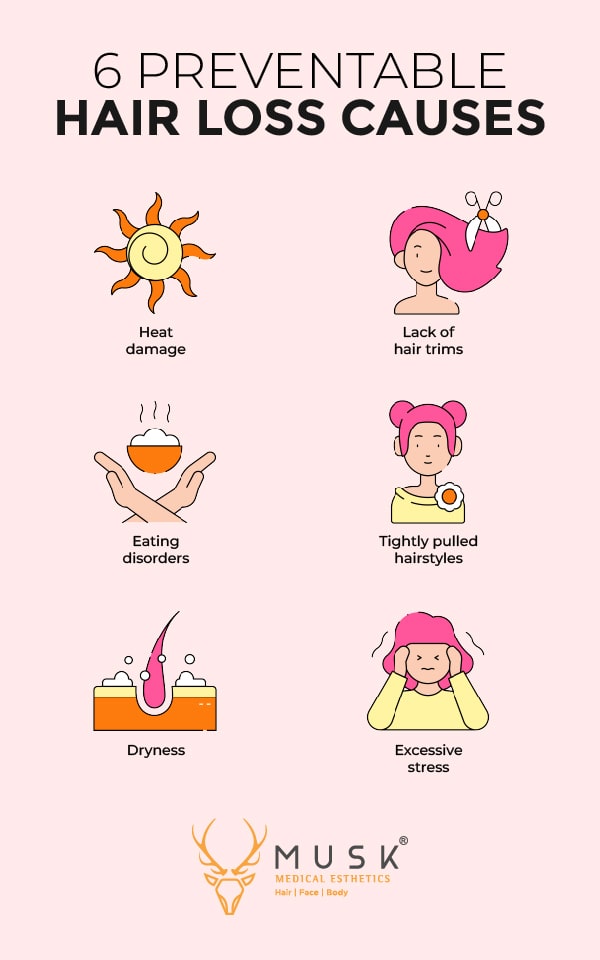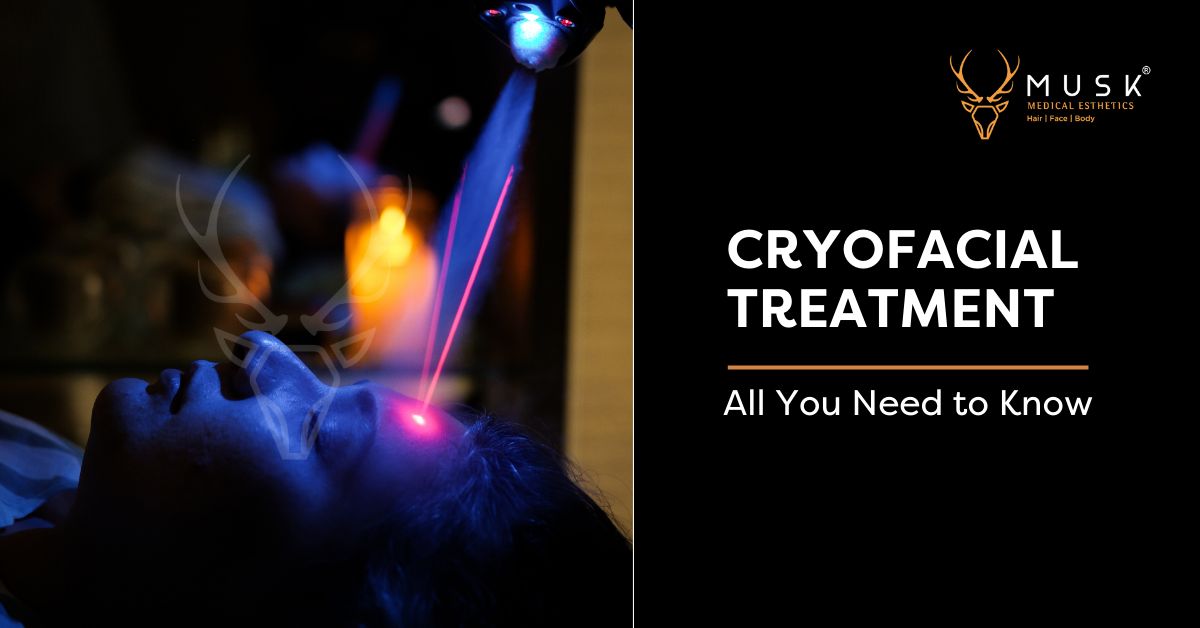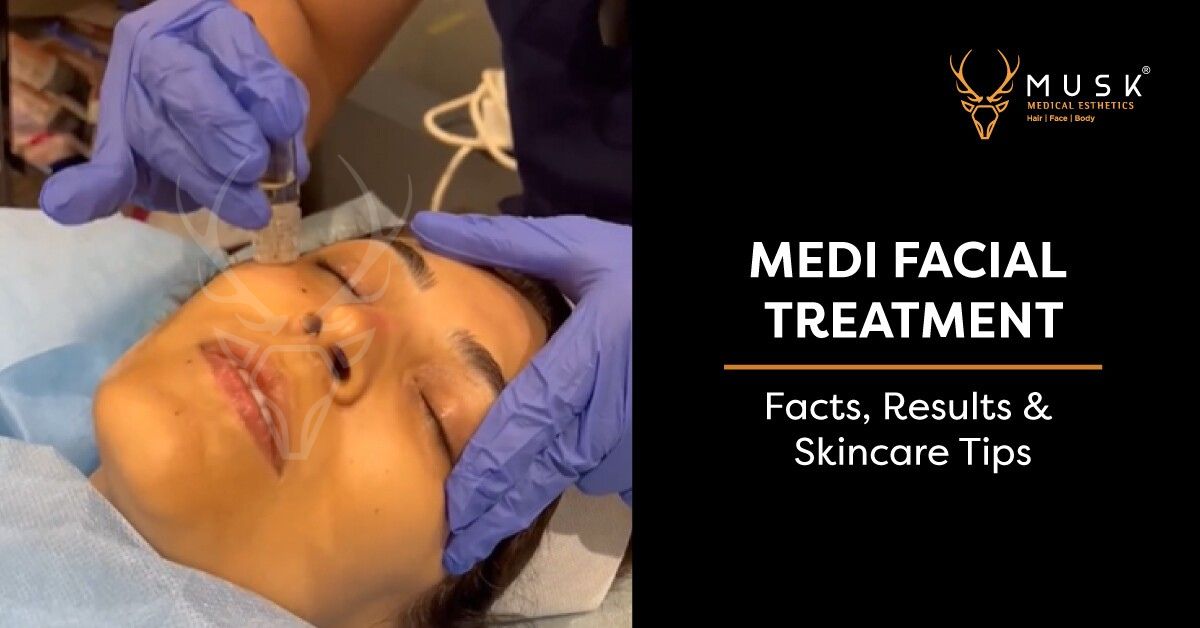
Unlock the Secret to Gorgeous Hair: 6 Preventable Hair Loss Causes Revealed
Just as the leaves gracefully descend from trees during autumn, our hair can also face challenges like thinning or receding, resulting in patches or receding hairlines. Restoring the health of our hair from its roots and nourishing our scalp becomes essential in such cases. However, understanding the underlying causes of these issues is crucial for effective solutions.
So, let’s explore the six preventable causes and reclaim the beauty of our locks.

1. Conquering Heat Damage for Healthy Hair
Heat styling tools like flat irons, curling irons, and blow dryers have become staples in many people’s haircare routines. However, excessive heat styling can be a hidden culprit behind hair damage and loss. When hair is subjected to high temperatures, it can lead to the breakdown of proteins in the hair shaft, causing weak and brittle strands.
Consider the following tips to minimize heat damage and Hair Protection
- Temperature Control
- Heat Protectants
- Air Drying
- Limit Styling Frequency
- Use Heat-Free Styling Techniques
- Deep Conditioning
By implementing these tips, you can minimize heat damage and protect your hair from unnecessary breakage and loss. Embrace a more mindful approach to heat styling, and your hair will thank you with improved health and renewed beauty.
2. Overcoming Eating Disorders for Hair Health
When it comes to maintaining healthy hair, proper nutrition plays a crucial role. Poor nutrition, often associated with eating disorders such as anorexia nervosa or bulimia, can have detrimental effects on hair health. Insufficient intake of essential nutrients, such as proteins, vitamins, and minerals, can lead to weakened hair follicles, resulting in thinning or hair loss.
To promote healthy hair growth and combat the effects of eating disorders, it is essential to encourage a balanced diet. This involves consuming a variety of nutrient-rich foods, including lean proteins, fruits, vegetables, whole grains, and healthy fats. These provide the necessary building blocks for strong, vibrant hair.
3. The Importance of Regular Hair Trims
Contrary to a common myth, getting regular hair trims does not lead to increased hair loss. In fact, neglecting regular trims can have adverse effects on hair health. Over time, split ends and breakage can occur, which can make the hair look thinner and less vibrant.
The frequency of hair trims can vary depending on individual hair types and goals. On average, it is recommended to get a trim every 6 to 8 weeks. However, this can be adjusted based on factors such as hair length, texture, and the presence of any specific hair concerns.
Remember, regular trims are not about sacrificing hair length but rather ensuring the health and vitality of the hair. Embrace the surprising solution of regular hair trims to maintain healthy, beautiful locks.
4. Avoiding Hair Damage from Tightly Pulled Hairstyles
Tightly pulled hairstyles, such as ponytails, buns, braids, and cornrows, are often chosen for their sleek and polished appearance. However, these hairstyles can come at a price when it comes to hair health. The constant tension applied to the hair follicles from tightly pulled styles can lead to a condition known as traction alopecia.
Traction alopecia is a form of hair loss caused by prolonged tension on the hair follicles. Tight hairstyles, when worn frequently or for extended periods, can lead to this condition. The constant pulling can cause damage to the hair shaft and weaken the hair follicles, resulting in thinning, breakage, and even permanent hair loss in the affected areas.
Significance of Hair-Friendly Practices
-Avoid Excessive Manipulation
-Use Gentle Hair Accessories
-Protect Hair During Sleep
-Maintain a Healthy Scalp
Remember, prioritizing the health of your hair is key to maintaining its natural beauty in the long run.
5. Combating Dryness for Luscious Locks
Dry hair can be a significant contributor to hair loss and can leave your hair looking dull, lifeless, and prone to breakage. Understanding the causes of dryness, its impact on hair health, and implementing effective strategies to combat dryness and maintain hair moisture are crucial for achieving and maintaining healthy, lustrous locks.
Several factors can contribute to dry hair, including:
- Environmental Factors
- Heat Styling
- Overwashing
- Chemical Treatments
Effective Ways to Combat Dryness and Maintain Hair Moisture
A. Hydrate from Within: Drink an adequate amount of water daily to ensure overall hydration, which can benefit the health of your hair as well.
B. Gentle Cleansing: Use a mild, sulfate-free shampoo to avoid stripping the hair of its natural oils. Limit shampooing to every other day or a few times a week to allow your hair’s natural oils to nourish and protect the strands.
C. Condition Regularly: Use a moisturizing conditioner after shampooing to replenish and seal in moisture. Focus on applying the conditioner to the mid-lengths and ends of the hair, as these areas tend to be drier.
D. Deep Conditioning Treatments: Incorporate deep conditioning treatments into your hair care routine once a week or as needed. These treatments provide intensive hydration and nourishment to restore moisture and improve the overall health of your hair.
By implementing these strategies and using suitable hair care products, you can restore moisture, improve the texture and appearance of your hair, and reduce the risk of hair loss due to dryness.
6. Managing Excessive Stress for Healthy Hair
Excessive stress can have a significant impact on hair health and contribute to hair loss. Understanding the link between stress and hair loss, implementing effective stress management techniques, and prioritizing self-care and relaxation are essential in maintaining healthy hair.
Stress can lead to two types of hair loss:
A. Telogen Effluvium: This is a condition characterized by excessive shedding or thinning of hair. Stress can push hair follicles into a resting phase, known as the telogen phase, causing more hair to shed than usual.
B. Trichotillomania: This is a hair-pulling disorder often triggered by stress or anxiety. People with trichotillomania have an irresistible urge to pull out their hair, leading to patches of hair loss.
Stress Management Techniques to Prevent Hair Loss
To prevent stress-related hair loss, it is crucial to manage stress effectively. Here are some stress management techniques you can incorporate into your routine:
- Exercise
- Relaxation Techniques
- Time Management
- Social Support
- Hobbies and Leisure Activities
- Adequate Sleep
- Healthy Diet
- Scalp Massage
- Limit Hair Manipulation
Remember, taking care of your mental and emotional health is essential for maintaining healthy, beautiful hair.
Properly nurturing to conclude
We have explored the six preventable causes of hair loss and discussed the importance of addressing them to maintain healthy and beautiful hair. By implementing these preventive measures, you can protect your hair from unnecessary damage and maintain its health and beauty. Embrace your natural beauty and have confidence in your hair’s potential.
For more information and personalized guidance, visit www.muskclinic.com where you can find expert advice and professional support for all your hair care needs.
Remember, your hair is a reflection of your overall well-being. Nurture and care for it, and let your beautiful locks shine with confidence.
Read More:
6 ESSENTIAL TIPS FOR SUMMER HAIR CARE
BENEFITS OF PRP TREATMENT FOR HAIR LOSS: WHAT YOU NEED TO KNOW
THE ULTIMATE GUIDE FOR STOPPING HAIR THINNING IN MEN AND WOMEN
- Skin Care



